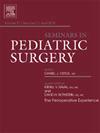Anesthetic considerations for fetal interventions
IF 1.4
3区 医学
Q3 PEDIATRICS
引用次数: 0
Abstract
Fetal therapy is a well-established but rapidly evolving field discipline. Fetal interventions require a multidisciplinary team approach that emphasizes collaboration and communication. The success of a fetal therapy program relies on the availability of a comprehensive obstetric and neonatal care team, support services, and advanced imaging. Technological advancements in prenatal fetal imaging and genetic diagnosis have improved our understanding of various fetal anomalies. Surgical techniques and anesthetic management have also advanced, leading to better outcomes. Fetal anesthesia presents unique challenges as it involves managing both the mother and the fetus. Anesthetic management focuses on ensuring maternal safety and comfort, maintaining adequate uteroplacental perfusion, optimizing surgical conditions, and minimizing risks for both the mother and the fetus. This article reviews current anesthesia practices for fetal surgery, highlighting recent advances and future directions.
胎儿干预的麻醉注意事项
胎儿治疗是一门成熟但发展迅速的学科。胎儿干预需要多学科团队的合作与沟通。胎儿治疗项目的成功有赖于全面的产科和新生儿护理团队、支持服务和先进的成像技术。产前胎儿成像和基因诊断技术的进步提高了我们对各种胎儿畸形的认识。手术技术和麻醉管理也在不断进步,从而带来了更好的治疗效果。胎儿麻醉是一项独特的挑战,因为它涉及母亲和胎儿的管理。麻醉管理的重点是确保孕产妇的安全和舒适、维持充足的子宫胎盘灌注、优化手术条件以及将孕产妇和胎儿的风险降至最低。本文回顾了当前胎儿手术的麻醉实践,重点介绍了最新进展和未来方向。
本文章由计算机程序翻译,如有差异,请以英文原文为准。
求助全文
约1分钟内获得全文
求助全文
来源期刊

Seminars in Pediatric Surgery
PEDIATRICS-SURGERY
CiteScore
2.80
自引率
5.90%
发文量
57
审稿时长
>12 weeks
期刊介绍:
Seminars in Pediatric Surgery provides current state-of-the-art reviews of subjects of interest to those charged with the surgical care of young patients. Each bimontly issue addresses a single topic with articles written by the experts in the field. Guest editors, all noted authorities, prepare each issue.
 求助内容:
求助内容: 应助结果提醒方式:
应助结果提醒方式:


